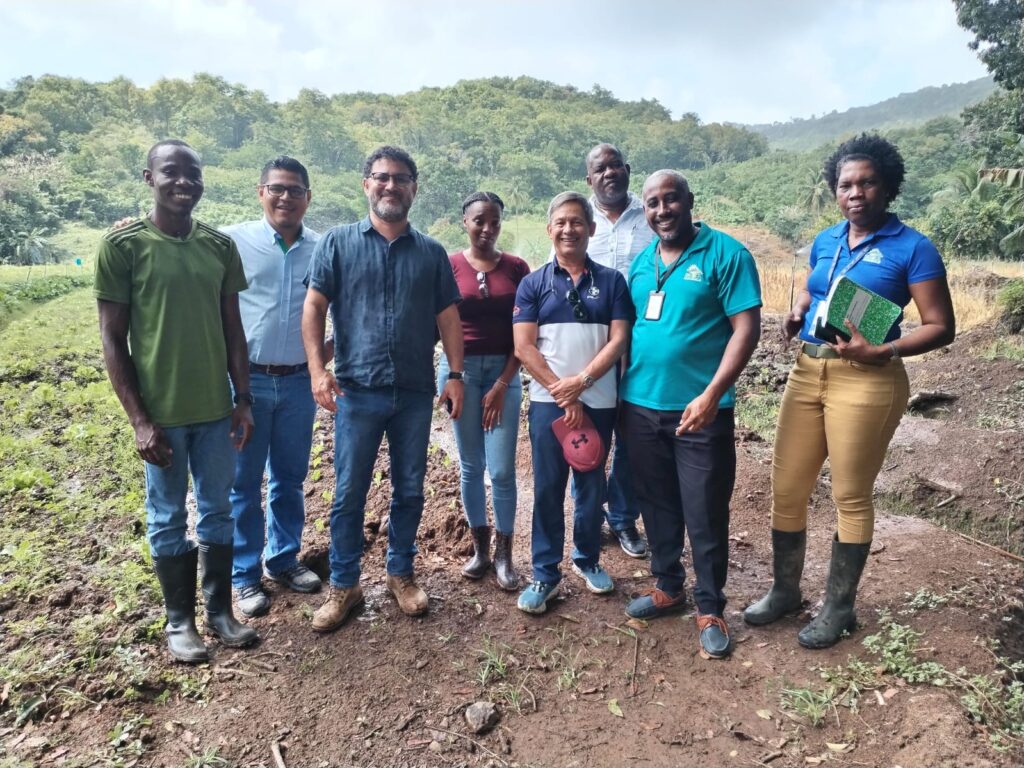The Food and Agriculture Organization (FAO) of the United Nations is working with Zamorano University to help Saint Lucia introduce and promote the use of natural pest control methods.
This is in response to a request from the Ministry of Agriculture, Fisheries, Food Security, and Rural Development.
FAO and Zamorano University have signed a letter agreement to support activities that provide farmers with alternative ways to manage pests and diseases while reducing pesticide use.
Last week, two experts from Zamorano, an FAO Agriculture Officer, and personnel from the Ministry of Agriculture visited farms to assess local farming systems. They looked at common pests and diseases, types of crops, farming techniques, and the knowledge of farmers and agricultural officers in different regions.
Experts from Zamorano University also assessed the existing capacities and staff at the National Diagnostic Facility (NADF) laboratories. The week concluded with training for 23 participants, including plant protection officers, extension officers, and agriculture students, on Integrated Pest Management (IPM), focusing on biological pest control.
The Ministry of Agriculture requested FAO’s technical support to explore the possibility of producing biological control agents locally. These natural solutions would give farmers better options to manage pests and diseases in a way that is safe for both people and the environment. Early findings suggest that NADF has the capacity to produce some of these agents.

Under the FAO-Zamorano University agreement, two staff from NADF will be trained at the universities’ laboratory for a practical learning on how to produce biopesticides, beneficial insects (natural enemies), entomopathogenic nematodes and beneficial bacteria. When they return to Saint Lucia, they will begin identifying, producing, and distributing local biological control agents to farmers. This initiative will give farmers alternatives to chemical pesticides. Additionally, Saint Lucia is expected to train agricultural professionals from other Caribbean countries.
In speaking about this initiative which considered the island’s high susceptibility to climate change and increased pest/diseases, FAO’s Plant Production and Protection Officer Melvin Medina Navarro stated, “Zamorano University possess vast experience in research, commercial production and increased access to small, medium and large-scale farmers in Central America under tropical conditions. Based on Saint Lucia’s newly installed capacities, this agreement will help to produce certain biological control agents increasing access to alternative and sustainable solutions to control pest/diseases affecting fruits, vegetables as well as roots and tubers”.
Chief Plant Research Officer from the Ministry of Agriculture in charge of NADF, Hannah Romain said this intervention by the FAO in supporting Saint Lucia in building capacity in integrated pest management specifically biological control is very timely.
“Over the past years, the ministry has been promoting Integrated pest management in the face of climate change and to ensure food safety practices among farmers. The ministry welcomes the expertise from Zamorano University and looks forward to building a safe and secured agricultural system,” she said.
Senior Professor and Chief of the Biological Control Laboratory at Zamorano University, Rogelio Trabanino said they were able to learn directly from farmers about their main problems and pest control methods.
“This is important to decide what natural enemies will be ideal to implement. We had a great experience with participants at the workshop as they demonstrated enthusiasm with technical information and activities that will be realize in future activities. The facilities at the diagnostic laboratory are impressive and that will impact in the initiation of the project because once the technicians are trained at Zamorano, they will come directly to start a small-scale production,” he said.
The FAO said that by applying the skills and insights gained from this activity and training, stakeholders in Saint Lucia’s agricultural sector will be better equipped to strengthen sustainable local crop production, improve health, enhance food safety, and build a sustainable and resilient future.





When a countless number of people have died which thier lives should have been save but there was no one to do the work and while up to this moment people are dying of purching foods, végétale and fruits as a result of the ‘wellgrow ‘in making the plantes to harvest in week….note that whatever végétale or when we buy them and store it in the réfrigérateur, about a day it becomes watery because of the pesticides or well grow…